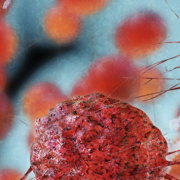Experts through experience: Becky’s story
Today, as part of our #GenomicsConversation week, we hear from Becky about her daughter’s complex condition, which remains undiagnosed even after genomic testing
Becky’s daughter has an assumed rare genetic condition. She is Becky’s first child, and arrived following a normal pregnancy and birth. The first signs that all was not well began very early: she was unsettled, and would cry and feed repeatedly during her first 12 weeks. Breastfed from birth, she gained weight more rapidly than expected, though health professionals were unconcerned.
As she grew, Becky’s daughter began to miss certain milestones, while meeting other milestones extremely early. She didn’t roll on to her front, she was late to sit up, and she never crawled – choosing to ‘bum shuffle’ instead. She began talking at 10 months (her first words were “up” and “go”), and she took her first steps at 22 months.
As a baby and toddler, Becky’s daughter was under the care of neurology and general paediatrics teams because of a suspected seizure and her unexplained weight gain. Over the years she has come under the care of other specialties, including ophthalmology, endocrinology, community paediatrics, cardiology and gastroenterology.
Searching for an answer
In her first year, Becky’s daughter was referred for an MRI which, due to her age, was carried out under general anaesthetic. Initially, Becky and her husband were reluctant to allow their daughter to have the test; however, they decided to act when a second referral was made.
The results from the MRI were not as expected: they did not explain her weight gain or the seizure, but they did identify a significant anomaly in the blood vessels in her brain. A follow-up CT scan confirmed these findings.
Joined-up communication
Over the years, the family has received conflicting advice. Becky explains that, on a couple of separate occasions, one consultant has wanted to treat a particular condition quite conservatively, while another has wanted to treat it aggressively. At times, if the family has felt that the balance of risk and reward has weighted towards risk, they have gone against medical advice.
Becky admits to finding the conflicting advice difficult, as well as the lack of communication between departments and trusts. She finds herself telling and re-telling the story of their diagnostic odyssey and answering the same questions over and over again with different clinicians. It also feels as though the onus is very much on the family to read up on and ask around about her daughter’s symptoms, and to join support groups to find out what the best options are. Becky and her husband are used to this, but as Becky points out, some families aren’t able to research or join support groups and just need their clinician to give them options.
A future diagnosis
Early genomic testing was carried out when Becky’s daughter was around 18 months old. She was also included in the Genetics of Obesity Study, though her results showed that no variants of significance had been found. Following a recent move across the country, their new clinical genetics team have suggested that Becky’s daughter be referred for which will test for a broader range of conditions than she was originally referred for, in the hope that it will give the family some answers.
Becky’s advice to people just starting out on their diagnostic journey is to trust your own instincts: you know your child best, and you must have faith in yourself as a parent.









